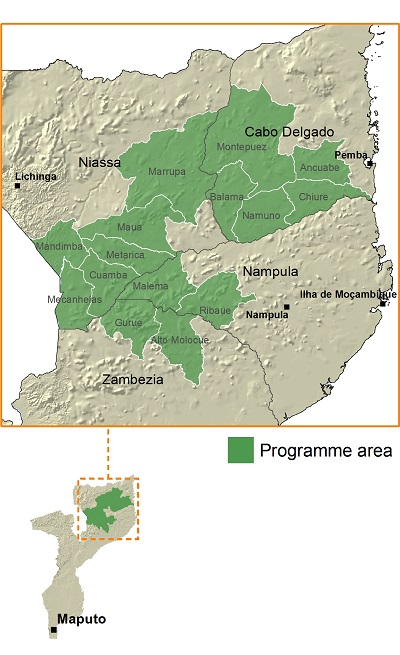Rural Markets Promotion Programme (PROMER)
IFAD Asset Request Portlet
Publicador de contenidos
Rural Markets Promotion Programme
This programme helps small-scale farmers in the northern region of the country, where two-thirds of the rural population is poor. In addition to other financing, it is receiving US$9.9 million in grant funding from the European Union through IFAD.
Although this part of the country has good agricultural potential, farms there have some of the lowest yields in southern Africa. Poor returns from sales of their agricultural surpluses have led small-scale farmers in the region to fall back on semi-subsistence agriculture.
The programme builds on emerging opportunities for both domestic and export markets, and particularly for agribusiness investment, to improve the terms of trade for small-scale farmers. It helps small farming households make the transition from subsistence to market-oriented agriculture, achieving higher productivity and better market integration.
The target group includes small-scale, semi-subsistence farmers and other poor farmers, most of whom live below the poverty line. Women are an important part of the target group because of their disadvantaged position in society and in the economy, and because they are often the poorest members of the rural population.
The programme's overall aim is to enable small-scale farmers to increase their incomes from agriculture by helping them market their surpluses more profitably. Its specific aims are to:
- Improve small-scale farmers' access to and participation in agricultural markets and value chains
- Develop more efficient market intermediaries and partnerships to stimulate increased agricultural production and added value
- Create a more conducive environment for agricultural market operations.
The multi-sectoral programme is in line with the government's poverty reduction strategy, and it coordinates with several public institutions at the national, provincial and district levels. It also works with farmers' organizations and traders to improve market efficiency; introduces a demand-driven facility to advance commercial partnerships between small farmers and agribusiness companies; and promotes development of a network of dealers in agricultural inputs.
EU Food Facility in Mozambique: video
Source: IFAD
